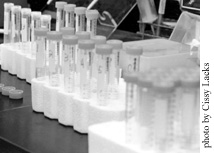Free PSA Less Helpful for PSA 2.6 to 4
 Various components of the PSA Study were featured in presentations for a recent American Urological Association meeting by William J. Catalona, MD; Kimberly Roehl, MPH; and JoAnn Antenor, BS. We thought the QUEST readers would be interested in their findings.
Various components of the PSA Study were featured in presentations for a recent American Urological Association meeting by William J. Catalona, MD; Kimberly Roehl, MPH; and JoAnn Antenor, BS. We thought the QUEST readers would be interested in their findings.
PSA cutoffs lower than 4 are now being used with increasing frequency around the world for recommending a prostate biopsy.
Dr. Catalonas PSA study has used a 2.5 cutoff for recommending a biopsy since 1995. Several studies have now shown that 20-25% of men with a PSA of 2.5-4 have prostate cancer detected on needle biopsies.
Lower PSA cutoffs detect more cancers but also require more biopsies. When the total PSA is 4 to 10, measurements of free PSA levels (that are generally higher with benign prostatic enlargement and lower in prostate cancer) can increase the accuracy of PSA testing by detecting 95% of cancers while eliminating 20% of unnecessary biopsies.
When the total PSA is in the narrower range of 2.5-4, the free PSA levels are not as effective in detecting cancers, according to a recent report from Dr. Catalonas research group. In fact, it would be asking a lot of free PSA to discriminate between cancer and benign disease in any very narrow range.
Free PSA works to reduce unnecessary (non-cancer-containing) biopsies in the 4-10 range, but if the 2.5 cutoff is used, it will require more biopsies to be performed.
It would be nice if free PSA could eliminate a lot of these extra biopsies, but it cant. The bottom line is that more biopsies have to be done to detect cancer earlier if the 2.5 cutoff is used for biopsy.
The recommendation for more biopsies seems reasonable since 25% of men with PSA 2.5 to 4 have cancer.
Also, it was previously believed that there was only one type of free PSA, and it was always increased in men with benign prostate enlargement. Now, it has been shown there are several different types of free PSA. Some of these are elevated with benign enlargement while others are elevated in cancer.
Further research is underway on the different forms of free PSA associated with cancer and benign enlargement.











